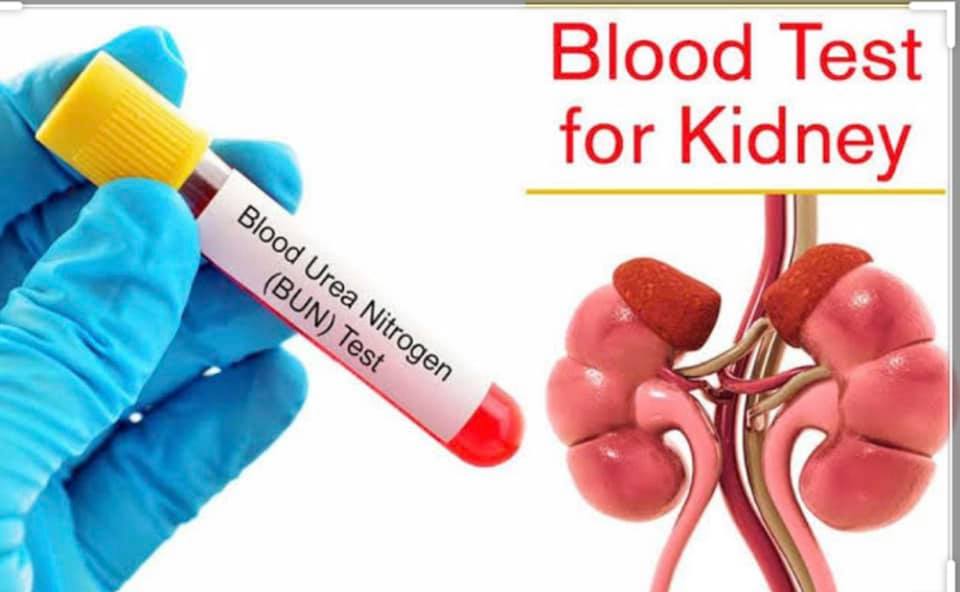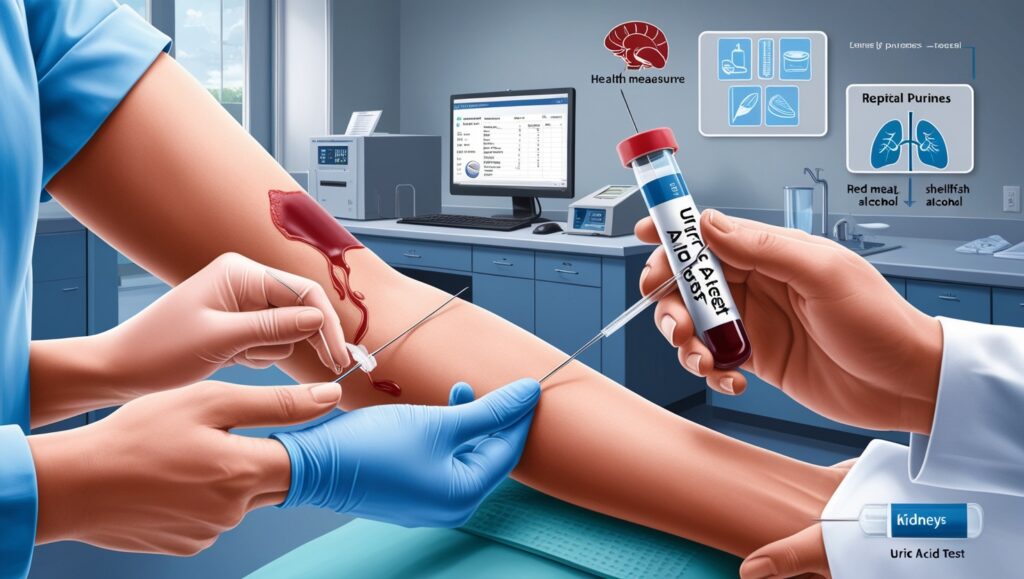
Overview of the Test:
The Blood Urea Nitrogen (BUN) test measures the concentration of nitrogen in the blood that comes from urea, a waste product produced when the body breaks down proteins. Urea is typically filtered out of the bloodstream by the kidneys and excreted in urine. This test is commonly used to assess kidney function, as the kidneys play a vital role in filtering urea from the blood.
While the BUN test is primarily used for monitoring kidney health, it can also provide valuable insights into other aspects of the body’s health, such as protein metabolism and hydration status. Elevated or decreased levels of BUN can indicate a variety of health conditions, including kidney diseases, dehydration, heart failure, and liver issues. As a result, it is commonly ordered in clinical settings during routine checkups or to monitor the progression of conditions that affect kidney function.
BUN testing can also assist in assessing nutritional status, particularly in evaluating protein intake and metabolism in patients with malnutrition or those undergoing treatments that may impact protein breakdown. It is often performed alongside other tests such as creatinine levels to provide a more comprehensive picture of kidney function.
.
The Blood Urea Nitrogen (BUN) test helps diagnose and monitor several conditions, including:
- Chronic Kidney Disease (CKD): Elevated BUN levels can indicate long-term kidney dysfunction, as the kidneys lose their ability to filter urea effectively over time.
- Acute Kidney Injury: A sudden increase in BUN levels may signal an acute decline in kidney function, often due to factors such as injury, infection, or drug toxicity.
- Dehydration: High BUN levels can be a sign of dehydration, as reduced fluid intake leads to a more concentrated blood urea nitrogen.
- Heart Failure: Poor circulation and decreased blood flow to the kidneys in heart failure can result in elevated BUN levels, reflecting compromised kidney function.
- Liver Disease: Although the liver produces urea, severe liver damage can lead to reduced urea synthesis, potentially resulting in lower-than-normal BUN levels.
- Nutritional Status: The BUN test can help evaluate protein metabolism. Low BUN levels may suggest malnutrition or a low-protein diet, while high levels may indicate excessive protein breakdown or intake.
Reasons for Ordering the Test:
A healthcare provider may recommend a BUN test when:
- Symptoms of Kidney Problems: If a patient presents symptoms like swelling, fatigue, changes in urination (such as increased or decreased frequency or volume), or back pain, a BUN test can help assess potential kidney dysfunction. These symptoms may indicate issues with kidney filtration and excretion processes, making the BUN test a useful diagnostic tool.
- Monitoring Chronic Conditions: For patients with chronic conditions like diabetes or hypertension, which are known risk factors for kidney disease, the BUN test is often used to monitor kidney health over time. These conditions can damage the kidneys gradually, so regular BUN testing helps detect early signs of kidney impairment.
- Assessing Dehydration: Dehydration can cause an elevation in BUN levels due to a decrease in kidney filtration efficiency. A BUN test is valuable in assessing hydration status, especially in patients who may be at risk of dehydration due to illness, high fever, or inadequate fluid intake.
- General Health Check-ups: For individuals at higher risk of kidney problems, such as the elderly or those with a family history of kidney disease, a BUN test may be part of a routine health screening to evaluate kidney function and identify potential issues before symptoms arise.
- Monitoring the Effectiveness of Treatments: In patients undergoing treatments that may affect kidney function—such as chemotherapy, diuretics, or NSAIDs—a BUN test can help track kidney health. These treatments can alter kidney filtration, and regular BUN testing helps healthcare providers ensure kidney function is not compromised during treatment.
Test Procedure and Method:
The BUN test is typically performed on a blood sample, which is usually collected from a vein in the arm. A healthcare provider will clean the area of the skin with an antiseptic and use a needle to draw blood into a vial or tube. This process takes only a few minutes and is generally well-tolerated by most patients. Once the blood sample is collected, it is sent to a laboratory for analysis.
In the laboratory, the concentration of urea nitrogen in the blood is measured using an automated analyzer that uses chemical reactions to quantify the levels of blood urea nitrogen. The test is simple, quick, and minimally invasive.
In some cases, to further assess kidney function, a urine test may also be conducted. This typically involves measuring the amount of urea excreted in the urine over a 24-hour period (known as a 24-hour urine collection test). This additional test helps to evaluate kidney function and the kidneys’ ability to filter and excrete waste products.
Key Biomarkers Measured:
- Blood Urea Nitrogen (BUN): The primary component of the test, BUN reflects kidney function and protein metabolism. Elevated or decreased BUN levels provide important insights into kidney health, hydration status, and overall protein breakdown in the body.
Preparation and Guidelines:
- Fasting: In most cases, fasting is not required for a BUN test. However, if the test is being conducted as part of a larger panel of tests (e.g., a comprehensive metabolic panel), fasting for 8–12 hours may be recommended. This ensures that food intake does not affect the results of other tests that may be included in the panel, such as blood glucose or lipid levels.
- Medications: It is important for patients to inform their healthcare provider of any medications they are taking. Certain drugs, such as antibiotics, diuretics, and corticosteroids, can impact BUN levels by either increasing or decreasing the concentration of urea nitrogen in the blood. Based on the medications, the healthcare provider may recommend temporarily discontinuing some drugs before the test, if necessary.
- Hydration: Since dehydration can lead to elevated BUN levels, patients are generally advised to ensure they are well-hydrated before the test. Dehydration causes the blood to become more concentrated, which can artificially raise BUN levels, potentially leading to an inaccurate assessment of kidney function.
- Routine Activities: For most patients, routine activities do not require modification before the test. However, if there have been significant changes in diet, exercise, or lifestyle recently (such as starting a new medication or altering protein intake), patients should discuss these changes with their healthcare provider. Certain factors can influence BUN levels, so understanding the patient’s recent habits is essential for accurate interpretation of the results.
Interpreting Results:
- Normal Range: A typical BUN level is between 7 to 20 mg/dL. However, reference ranges can vary slightly depending on the laboratory and the methods used for analysis. It is important to consult the specific laboratory’s reference range for the most accurate interpretation of results.
High BUN Levels:
Elevated BUN levels may indicate several potential health concerns:
- Kidney Disease: When kidney function is impaired, the kidneys are less able to filter out waste products like urea, leading to higher BUN levels in the blood. This is commonly seen in conditions like chronic kidney disease (CKD) or acute kidney injury (AKI).
- Dehydration: Reduced fluid intake or excessive loss of fluid can concentrate the blood, raising BUN levels. Dehydration leads to less efficient kidney filtration, resulting in higher urea concentrations.
- High-Protein Diet: A diet high in protein increases the amount of protein breakdown in the body, producing more urea as a byproduct. This can elevate BUN levels, especially in individuals who consume large amounts of protein-rich foods.
- Heart Failure: In heart failure, reduced blood flow to the kidneys can impair their function, leading to an accumulation of waste products like urea in the blood and, consequently, elevated BUN levels.
Low BUN Levels:
Decreased BUN levels can also indicate various health issues:
- Liver Disease: The liver is responsible for producing urea. When the liver is diseased or damaged (e.g., cirrhosis, hepatitis), it may produce less urea, leading to lower-than-normal BUN levels.
- Malnutrition or Low Protein Intake: Insufficient protein intake can reduce the body’s production of urea, resulting in lower BUN levels. Malnutrition can lead to this condition, especially if there is inadequate dietary protein or severe malabsorption.
- Overhydration: Excessive fluid intake can dilute the blood, resulting in a decreased concentration of urea nitrogen in the bloodstream. This may lead to lower BUN levels, although this condition is less common than dehydration.
Clinical Implications and Next Steps:
The results of the BUN test can significantly influence medical decisions and guide further action, including:
1. Diagnosis:
- If BUN levels are elevated, it may indicate impaired kidney function or other underlying health issues. To assess kidney function more comprehensively, healthcare providers may order additional tests, such as:
- Creatinine levels: To evaluate kidney function in conjunction with BUN, as both are key markers of kidney health.
- Glomerular Filtration Rate (GFR): This test estimates how well the kidneys are filtering waste, and it helps determine the stage of kidney disease.
- Urine tests: Including urine protein or a 24-hour urine collection test to assess how well the kidneys are excreting waste and filtering urea.
2. Treatment Adjustments:
- Elevated BUN levels may indicate the need to adjust existing treatment plans, such as:
- Modifying medications: Certain medications, such as diuretics or ACE inhibitors, can impact kidney function. If elevated BUN levels are noted, healthcare providers may adjust or change these medications.
- Addressing dehydration: If dehydration is identified as the cause of high BUN levels, treatment will focus on rehydration, either through oral fluids or intravenous (IV) fluids, depending on severity.
3. Referral:
- In cases of severe kidney dysfunction, where BUN levels are significantly high, a referral to a nephrologist (kidney specialist) may be necessary. The nephrologist will further assess kidney function and recommend more advanced treatment options or management strategies, such as dialysis or transplantation, in cases of advanced kidney disease.
4. Lifestyle Modifications:
- For patients with high BUN levels due to dehydration or a high-protein diet, lifestyle adjustments may be recommended. This includes:
- Hydration: Ensuring adequate fluid intake to prevent dehydration, which can help normalize BUN levels.
- Dietary changes: Modifying protein intake to ensure a balanced diet that supports healthy kidney function without overloading the kidneys with excessive protein breakdown products.
- Exercise and weight management: For individuals with underlying conditions like hypertension or diabetes, managing weight and adopting a healthy lifestyle can help reduce the strain on the kidneys and prevent further kidney damage.
.
Frequently Asked Questions:
1. How accurate is the BUN test?
The BUN test is highly accurate in measuring urea nitrogen levels in the blood. However, it is important to interpret the results alongside other kidney function tests, such as creatinine levels, to get a comprehensive picture of kidney health. The BUN test alone cannot provide a definitive diagnosis but helps guide further testing and clinical decision-making.
2. Is there any risk or discomfort during the test?
The BUN test involves a simple blood draw, which may cause mild discomfort or slight bruising at the needle site. These side effects are usually temporary and resolve on their own. There are no significant risks associated with the test, and it is considered a safe and routine procedure.
3. How long do results take?
BUN test results are typically available within a few hours to a day, depending on the laboratory’s processing time. If the test is part of a larger panel of tests, it may take longer to receive all results. Healthcare providers will inform patients when the results are available and discuss the findings in a follow-up consultation.
4. What should I do after the test?
There are no special instructions after a BUN test. Most patients can resume normal activities immediately after the test, including work, exercise, and other daily routines, unless otherwise advised by the healthcare provider. If any issues arise from the blood draw, such as persistent pain or bruising, patients should contact their healthcare provider.
Final Thoughts and Recommendations:
The BUN test is an essential and reliable tool for assessing kidney function and evaluating overall health. It provides valuable insights into how well the kidneys are filtering waste products, and it can help identify potential kidney issues, dehydration, or nutritional concerns. However, it is important to remember that BUN levels should be interpreted in the context of other tests, such as creatinine and GFR, to gain a comprehensive understanding of kidney health.
Patients should always discuss their test results with their healthcare provider, especially if the results fall outside the normal range. A healthcare provider can offer guidance on appropriate next steps, such as additional diagnostic tests, adjustments in treatment, or lifestyle changes. Timely and accurate interpretation of BUN results can lead to early intervention, preventing the progression of kidney disease and other related health issues.
For individuals at risk of kidney disease or those with chronic conditions like diabetes or hypertension, regular monitoring of kidney function through tests like BUN is crucial. Early detection and proactive management can significantly improve health outcomes, reduce complications, and enhance the quality of life. Always consult with a healthcare provider to ensure that any concerns are addressed appropriately.


